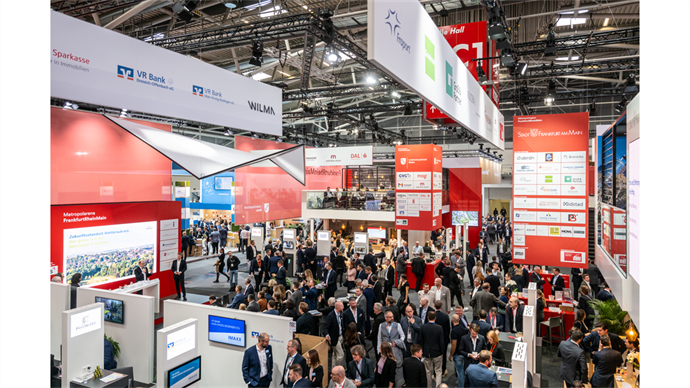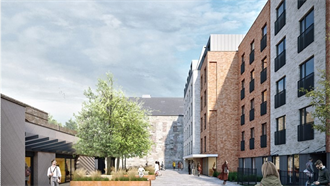While real estate may not be out of the woods yet, many delegates at Expo Real agreed that the wait-and-see point has been passed and the time has come to act.
Although it was Winston Churchill who first said, ‘If you’re going through hell, keep going’, that sentiment was echoed in myriad ways at this year’s Expo Real.
Christof Winkelmann, chief market officer at Aareal Bank, said: ‘We’re coming out of four years of doom rather than glory. But people have a smile on their faces at Expo Real. They might not be partying yet, but there’s a sense that real estate isn’t a no-go area anymore.’
Winkelmann added that Aareal Bank had continued to pursue key segments through the more difficult years, with asset classes such as hotels proving resilient. The bank increased its exposure to hospitality during Covid and has seen the success story continue – ‘the numbers work’, he underlined. ‘People will continue to travel – it’s not just a bubble.’
Residential and logistics are other dynamic segments for the bank, with Aareal unveiling a major shed financing deal with Boreal IM at Expo. ‘We don’t finance single assets – we want to do portfolio deals,’ he said.
Deals on the table
While the industry perceives that it is not entirely out of the woods in terms of macroeconomic problems and the threats presented by global geopolitics, conversations at the event confirmed that for most investors, now is the time to act.
Several delegates said that current market dislocations are proving rich fodder for transactional activity, while many others predicted a tsunami of deals around the corner as interest rates and inflation continue to decline.
Investor ‘fear of missing out’ is helping drive a resurgence in logistics deals, according to Rory Buck, managing director at Clarion Partners Europe.
‘I think we have passed the wait-and-see point,’ Buck added. ‘Here at Expo, I’m seeing more optimism than pessimism as I walk around. Repricing is over in the core markets and in Europe’s secondary markets, people are seeing the light at the end of the tunnel.’
For Pierre-David Baylac, head of logistics Europe for Generali Real Estate, ‘investors have all been standing around the edge of the pool, dipping in their toes, but no-one wants to dive in’. However, he called 2024 ‘a year of stabilisation’.
Baylac said he had noticed core deals coming back, in addition to core-plus, giving the markets ‘a sense of where core is landing’. Appreciation was likely to be round the corner, with yields also set to tighten, he predicted. ‘Rental growth has been massive, and while values are unlikely to rise in the short term, the medium term looks positive.’
Development drives
The City of London was back at Expo Real for the second time in the name of development and redevelopment. Chairman of the City of London Corporation planning and transportation committee Shravan Joshi said he was at Expo to ‘seek partnerships with the real estate market, informally and via partnering structures’, as part of the City Corporation’s plans to diversify its ‘multi-billion-pound asset base over the next 10 years’.
He noted: ‘With a 98% planning application approval rating, the City of London has a healthy pipeline of development, with many major schemes being submitted, as well as hundreds of thousands of square metres of office space development currently under construction.’
Pepijn Morshuis, CEO of developer and investor Trei Real Estate, said he was ‘cautiously optimistic’ about the development and investment outlook.
‘There’s a real sense that everyone wants to get started again,’ he told PropertyEU. ‘There is plenty of money out there, but everyone is thinking about how to invest it. It sounds like the market has definitely turned the corner; it’s not at full speed, but we’re moving from first gear to second.’
Trei is an active developer, particularly in the residential for rent space, and Morshuis noted that the firm had managed to take a number of projects forward thanks to some strategic planning. ‘A lot of the land we are building on, we have had in ownership for some time, so the cost basis is low,’ he said. ‘And we are not very highly leveraged, so we haven’t been hit with a lot of the problems that developers experience.’
And despite Germany’s economic woes, Morshuis said he still believed in the market. ‘You need to separate the kinds of projects that we do from the economic outlook. Prospects are rather good for residential, and there is still pressure on housing. Unemployment is also very low. But it’s clear that Germany needs to go through a period of modernisation and that will be slow.’
James Seppala, head of real estate Europe at Blackstone, said that capital markets in Germany 'are beginning to show signs of stabilisation, with transaction activity beginning to recover'.
'We have long been investors in Germany and whilst it’s true that some have been more cautious, we remain optimistic,' he remarked. 'Our active asset management and continued conviction in the long-term fundamentals of the sectors we’re invested in, mean our portfolio is well-positioned and continues to perform.'


































